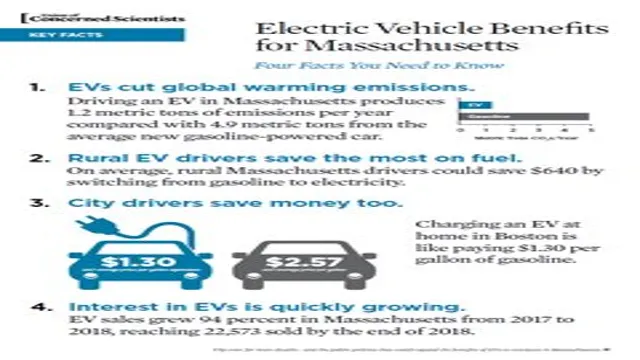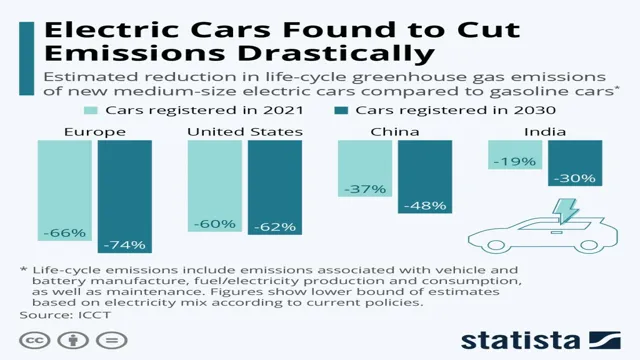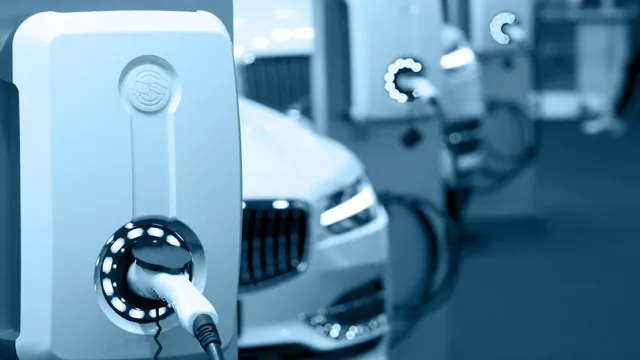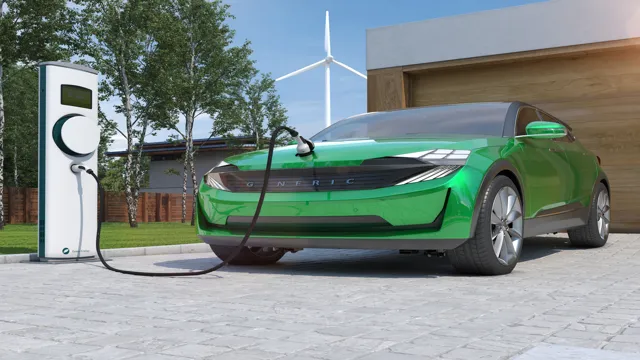Exploring the Pros and Cons: How Electric Cars Affect Government Goals
Electric cars are the future of transportation, and governments around the world are taking notice. From tax incentives to carpool lanes, governments are finding ways to encourage people to go electric. But why all the fuss? The answer is simple: electric cars are better for the environment, and they save drivers money in the long run.
Governments understand that if more people switch to electric cars, the air will be cleaner, and the need for foreign oil will decrease. This is why many governments are taking steps to encourage the adoption of electric cars. But how exactly are they doing this, and is it working? Let’s take a closer look at the relationship between electric cars and government policies.
Environmental Benefits
When it comes to the environmental benefits of electric cars, it’s clear that they offer a significant advantage over traditional combustion engines. Electric cars have zero emissions at the tailpipe which means that they do not release harmful pollutants into the air, unlike their gas-powered counterparts. This makes them a much cleaner option for the environment and can help improve air quality in cities where pollution is a significant problem.
Additionally, electric cars are much quieter than traditional cars, which can help reduce noise pollution. While electric cars do require energy to recharge their batteries, the use of renewable energy sources such as solar or wind power can help to mitigate any negative environmental impact. Overall, it’s safe to say that electric cars are a boon for the environment and will play a significant role in reducing harmful emissions and safeguarding the planet for future generations.
As for the government, supporting the adoption of electric cars can help reduce dependence on foreign oil and improve energy security, which can ultimately benefit both the economy and the country as a whole.
Reduced Emissions & Pollution
One of the most significant benefits of reducing emissions and pollution is the positive impact on the environment. It’s no secret that our planet is suffering from the effects of excessive carbon emissions and toxic pollutants that are released into the atmosphere. By reducing these emissions, we are taking a crucial step towards reducing the negative impact on our planet and ensuring a healthier and more sustainable future for generations to come.
Cleaner air, water, and soil are just a few of the environmental benefits that result from reduced emissions and pollution. By transitioning to cleaner energy sources and implementing sustainable practices, we can reduce our carbon footprint and make a positive impact on the world around us. It’s time to take responsibility for our actions and do our part in preserving our planet for future generations.

Less Reliance on Fossil Fuels
Less reliance on fossil fuels is an essential step in reducing our carbon footprint and mitigating the effects of climate change. By transitioning away from non-renewable energy sources such as coal, oil, and natural gas, we can significantly reduce harmful greenhouse gas emissions and air pollution. This shift towards renewable energy sources, such as solar, wind, and hydroelectric power, can lead to a cleaner and more sustainable environment.
Additionally, reducing our dependency on fossil fuels can also decrease our reliance on foreign oil, promoting energy independence and security. While there may be initial costs and challenges in making the transition, the long-term benefits of reduced environmental damage and increased energy security are invaluable. Overall, moving towards sustainable energy sources is a vital step in protecting our planet and securing a better future for generations to come.
Economic Impact
When it comes to the economic impact of electric cars, the answer isn’t a straightforward one. While electric cars may benefit the government in the long run due to reduced reliance on foreign oil and decreased carbon emissions, they can initially hurt the government due to lost revenue from gas taxes. This revenue is typically used to fund road maintenance and infrastructure projects.
However, governments can implement alternative policies such as implementing an electric vehicle tax or increasing fees for vehicle registration to offset this loss. Additionally, the growth of the electric vehicle industry can lead to job creation and economic growth. It’s important to consider the long-term benefits of electric vehicles and the potential for a shift towards sustainable energy sources when evaluating their impact on the government and the economy.
Job Creation in the Electric Car Industry
The emergence of the electric car industry has brought about a significant economic impact, especially when it comes to job creation. This industry’s growth has created thousands of new jobs across various sectors, such as engineering, manufacturing, sales, and maintenance. As more and more companies invest in electric vehicle technology, there is a surge in employment opportunities for people with diverse skill sets.
Additionally, as the demand for electric vehicles increases, there will be a need for more charging infrastructure, which will create even more employment opportunities. Investing in this industry will not only create jobs but also boost the economy as a whole, as people who are employed in this sector will have more disposable income to spend on other goods and services. In summary, the electric car industry is a game-changer for job creation, and those interested in this field will likely be able to find employment opportunities for years to come.
Reduced Dependence on Foreign Oil
Reduced Dependence on Foreign Oil Reducing dependence on foreign oil has a significant economic impact on a nation. When a country relies heavily on imported oil, the demand for foreign currency increases, which can lead to a decrease in the value of its own currency. This in turn can lead to inflation and a rise in the cost of living.
By reducing dependence on foreign oil, a nation can keep more money within its own borders, boosting its economy and creating jobs. Additionally, reducing dependence on foreign oil can make a nation more energy independent, which can help protect the country from disruptions in the global oil market. This is particularly important when there are geopolitical conflicts or other factors that can cause oil prices to spike.
All in all, reducing dependence on foreign oil is a wise economic strategy that can bring many benefits to a nation and its people.
Government Revenue
When it comes to electric cars, one question that’s often asked is whether these vehicles benefit or hurt the government in terms of revenue. The answer, like many things, isn’t straightforward. On the one hand, electric cars are typically not subject to the same taxes and fees as gasoline-powered vehicles, such as fuel taxes and motor vehicle registration fees.
This means that electric car owners pay less in government revenue for these particular items. However, on the other hand, electric cars still require infrastructure to be built and maintained, such as charging stations, which ultimately comes with a cost that may need to be borne by the government. Electric cars also have the potential to reduce air pollution and greenhouse gas emissions, which could ultimately lead to reduced healthcare costs and damage caused by climate change, which could benefit the government and society as a whole in the long run.
Ultimately, it’s difficult to say whether electric cars benefit or hurt the government in terms of revenue, as there are many factors at play and different perspectives to consider.
Potential Tax Revenue from Electric Car Sales
Electric cars are undoubtedly the future of the automotive industry, and with their increasing popularity, there is also a significant potential for government revenue. The government can earn substantial tax revenue from electric car sales, considering their high price tag. The revenue can come from various sources, including sales tax, excise tax, and registration fees.
Furthermore, electric cars come with a higher maintenance cost, which can translate into higher tax revenue from service and repair sales. Moreover, the government can also implement fees for electric car usage such as charging taxes, tolls, and parking fees. While the upfront cost of electric cars might be higher, the long-term benefits from decreased emissions and reduced environmental damage can outweigh the initial investment, making them a win-win situation for both the government and the people.
Potential Revenue from Charging Station Fees
As the adoption of electric vehicles continues to grow, so does the demand for charging stations. Many governments around the world have recognized this trend and have started investing in building charging infrastructure. In addition to promoting sustainable transportation, these charging stations also generate revenue for the government.
Depending on the location and the level of demand, charging station fees can be a significant source of income. For example, in the United Kingdom, local governments can charge up to £50 for a 30-minute rapid charge.
If a station is used consistently, the revenue generated from the fees can be substantial. This income can be used to maintain the charging infrastructure, fund other public services, or even be reinvested in developing a more comprehensive charging network. As electric vehicles continue to become more popular, the potential for revenue from charging station fees will only increase, making it an attractive investment for governments worldwide.
Infrastructure Costs
Electric cars have been touted as a way to reduce carbon emissions and improve air quality in cities, but one question that often arises is whether they benefit or hurt the government. The answer is not clear cut, as it depends on various factors such as infrastructure costs and tax revenues. On one hand, electric cars can reduce the government subsidies for oil and gas industries, but on the other hand, they require significant investments in charging infrastructure and renewable energy sources.
Additionally, electric cars pay lower gasoline taxes, which means that the government may lose out on revenue that is used to fund road maintenance and public transportation. However, some argue that electric cars can still benefit the government in the long run by reducing healthcare costs associated with air pollution and mitigating the impacts of climate change. Overall, while there are some costs associated with transitioning to electric cars, the benefits can outweigh them in the long term.
Cost of Building Charging Stations
If you’re considering building charging stations, one of the most crucial aspects you need to pay attention to is the infrastructure costs. The cost varies depending on the number of charging stations you’re planning to install and the type of charger you’re using. For example, if you’re using a Level 1 charger, the infrastructure cost would be lower than installing Level 2 and DC fast chargers.
Additionally, the infrastructure cost would also vary depending on the location you’re choosing. If the location has electrical capacity, it would reduce the cost. On the other hand, if the location requires electrical upgrades, the infrastructure cost will go up.
Moreover, other factors like permits, labor, and equipment purchase, should be considered when calculating infrastructure costs. It’s important to get an estimate from professionals on what kind of infrastructure costs you can expect when building charging stations. Understanding the infrastructure cost will help you determine the feasibility and profitability of the project.
Potential Loss of Revenue from Gasoline Taxes
With the rise of electric vehicles (EVs), there has been a growing concern about the potential loss of revenue from gasoline taxes, which are crucial for funding infrastructure costs. As more people switch to EVs, the revenue generated from gas taxes could decline substantially, leaving a funding gap for maintaining and upgrading roads, bridges, and other transportation infrastructure. However, this problem is not insurmountable.
Governments can replace gas taxes with a mileage tax or an EV-specific tax that would generate revenue from EV owners. These taxes could be based on the number of miles driven or the battery size of an EV. Additionally, there are alternative models for funding infrastructure through public-private partnerships and tolls, which could generate revenue from commuters rather than fuel consumption.
With the right policies in place, it is possible to have a reliable and sustainable revenue stream for infrastructure funding, even in a world with fewer gasoline engines on the road.
Conclusion
In conclusion, the debate over whether electric cars benefit or hurt the government is a complex one. On one hand, electric cars may reduce the government’s reliance on imported oil, cut down on emissions, and potentially create jobs in the green energy sector. On the other hand, the government may lose revenue from gas taxes and may need to invest in infrastructure to support electric cars.
However, one thing is clear – the transition to electric cars is an important step towards a more sustainable future, and the government must adapt and develop policies that prioritize the environment and the long-term health of our planet. So, let’s drive towards a brighter, more electric future, one kilowatt hour at a time!”
FAQs
What incentives does the government offer for purchasing electric cars?
The government offers tax credits and rebates for purchasing electric cars to incentivize environmentally-friendly choices.
How do electric cars impact government revenue from gas taxes?
Electric cars don’t use gasoline, so they don’t contribute to the gas tax revenue that funds infrastructure and transportation projects. This could result in a loss of revenue for the government.
What is the government doing to increase the availability of charging stations for electric cars?
The government is investing in infrastructure projects to increase the availability of charging stations for electric cars, including funding for public charging stations and research into more efficient and convenient charging methods.
Are there any disadvantages for the government to promoting electric car use?
One potential disadvantage for the government is the cost associated with investing in infrastructure and offering incentives for electric car use. Additionally, if electric cars become too popular too quickly, it could strain the electrical grid and require further investment in energy infrastructure.





